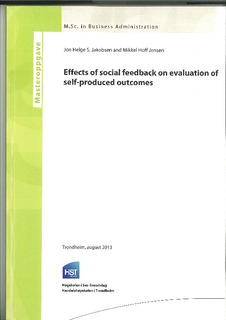| dc.description.abstract | This master's thesis is a study in marketing, on the topic of a form of co-production labelled self-production. This perspective claims that offerings provided by a producer need active participation from the consumer to provide value. An example could be co-producing goods and services using tools such as input products and devices. Existing research (Supphellen and Troye, 2012) suggests a positivity bias in consumer evaluation of self-produced outcomes, an effect which also extends to evaluations of the branded input product. This research is attempted replicated, and the influence of social feedback on consumer evaluations of self-produced outcomes is explored. The problem statement of the thesis is:
“How, if at all, does social feedback influence evaluations of self-produced outcomes?”
The thesis is built on the theoretical framework of the APE model by Gawronski and Bodenhausen (2006), explaining evaluation of outcomes through associative and propositional processes. A total of 114 participants performed an experiment, using a dinner kit from a large Norwegian producer. Five groups performed a self-production task in a kitchen laboratory: Two control groups with high and low levels of self-production and three groups with high levels of self-production and negative, neutral and positive social feedback. A total of five hypotheses were developed in line with theory, with all five receiving full support. The replication of previous research supports the notion of a positivity bias in evaluation of self-produced outcomes. Findings on the influence of social feedback indicated that while positive feedback did not seem to interrupt the positive effects caused by selfproduction,
neutral and negative social feedback had a detrimental effect on outcome evaluation. An additional hypothesis indicated that self-serving bias seemed to be activated by negative social feedback.
These findings have interesting managerial implications. If the positivity bias from selfproduction is countered by negative and neutral social feedback, providing increased customization opportunities could create better evaluations of self-produced outcomes. | no_NO |
